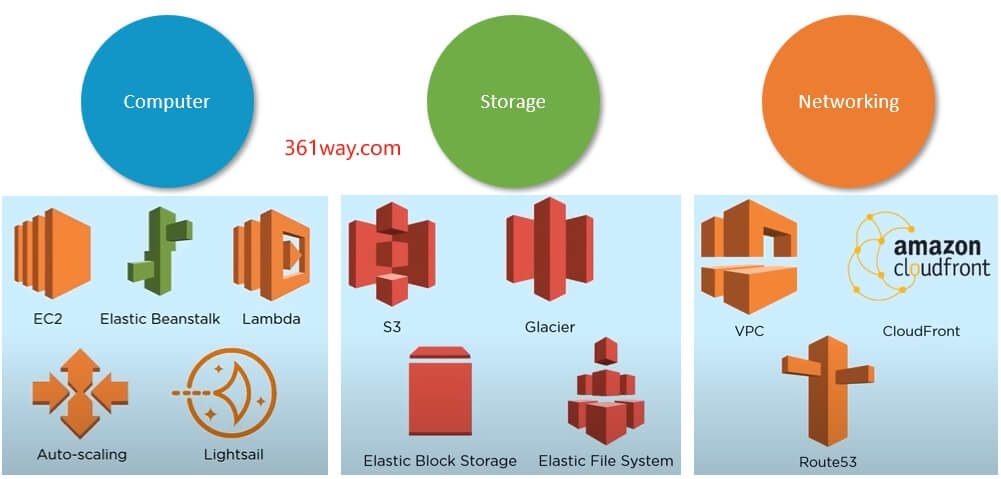3 basic cloud services
Define and explain the 3 basic types of cloud services and the AWSproducts that are built based on them.
No matter which cloud vendor basically starts with the three major components of computing, network, and storage.

Compute
AWS compute services are what give your applications the processing power they need to run in the cloud. They offer a variety of options depending on your needs, from fine-grained control of virtual machines to serverless options that automatically scale. Here's a quick rundown of some of the most popular services:
-
Amazon Elastic Compute Cloud (EC2): This is the granddaddy of AWS compute services. It gives you virtual machines (VMs) in the cloud that you can configure and manage just like you would on-premises servers. You have a wide range of options for CPU, memory, storage, and operating system.
-
Amazon Elastic Container Service (ECS) and Amazon Elastic Kubernetes Service (EKS): These services are designed for containerized applications. ECS lets you manage your own container clusters, while EKS is a managed Kubernetes service that lets you focus on your applications without having to worry about the underlying infrastructure.
-
AWS Lambda: This serverless compute service lets you run code without having to provision or manage any servers. You simply upload your code and AWS takes care of everything else. Lambda is a great option for short-lived tasks or microservices.
-
AWS Lightsail: This is a good option for simple applications that don't require a lot of configuration. Lightsail offers virtual machines, storage, databases, and networking in a single, easy-to-use package.
-
AWS Batch: This service is designed for running batch jobs that are submitted at a specific time or in response to a trigger. Batch jobs are typically short-lived and resource-intensive, such as data processing or scientific simulations.
-
AWS Elastic Beanstalk: This service makes it easy to deploy and scale web applications and services. Elastic Beanstalk supports a variety of programming languages and platforms, and it takes care of many of the infrastructure details for you.
Compute domain helps in the following aspects:
- To run any application
- Control and manage server functions such as scaling and deployment
- Run event-initiated stateless applications
Storage
AWS storage services offer a wide range of options for storing your data in the cloud, from basic object storage to file systems and specialized data storage solutions. Here's a breakdown of some key AWS storage services:
-
Amazon Simple Storage Service (S3): This is the most popular AWS storage service. It's an object storage solution that's incredibly scalable, durable, and cost-effective. You can store any kind of data in S3, from photos and videos to backups and archives.
-
Amazon Elastic Block Store (EBS): This service provides block storage for virtual machines running on EC2. EBS volumes behave like traditional hard drives that you can attach to your VMs. EBS is a good option for storing data that needs to be accessed frequently by a single EC2 instance.
-
Amazon Elastic File System (EFS): This service provides a scalable file system that can be accessed by multiple EC2 instances. EFS is a good option for storing data that needs to be shared between multiple applications or users.
-
Amazon FSx: This service offers a variety of file system options for specific workloads. For example, Amazon FSx for Lustre is designed for high-performance computing workloads, while Amazon FSx for NetApp ONTAP offers a familiar file system experience for migrating existing applications.
-
Amazon S3 Glacier: This is a storage service designed for long-term data archiving. Glacier offers extremely low storage costs, but data retrieval times are slower than with S3.
-
AWS Storage Gateway: This service acts as a bridge between your on-premises storage and AWS storage services. With Storage Gateway, you can cache frequently accessed data locally for faster performance, while also securely backing up your data to AWS.
Storage domain helps in the following aspects:
- It holds all the information which the applications use
- They additionally support archival compliance requirements
- Object, file and block storage are the popular storage services
Networking
AWS Networking services provide the foundation for connecting your resources in the cloud. They allow you to build secure and scalable network architectures to meet the demands of your applications. Here's a glimpse into some of the core functionalities offered by AWS Networking services:
-
Network Foundations: Amazon Virtual Private Cloud (VPC): VPC acts as the bedrock of your private network within the AWS cloud. It allows you to create a logically isolated environment where you can define your own IP address range, subnets, and security groups. This grants you granular control over how your resources communicate with each other and the internet.
-
Application Networking: Amazon VPC Lattice: VPC Lattice simplifies managing network connectivity across geographically distributed VPCs. It facilitates communication between your VPCs with high bandwidth and low latency, enabling you to build robust and scalable applications.
-
Edge Networking: Amazon CloudFront: This service functions as a Content Delivery Network (CDN). CloudFront distributes content across a global network of edge locations, bringing content closer to users for faster loading times and improved user experience.
-
Hybrid Connectivity: AWS Direct Connect: Direct Connect establishes a dedicated network connection between your on-premises environment and the AWS cloud. This bypasses the public internet, offering a more secure and consistent connection for critical workloads.
-
Network Security: AWS Shield: Shield safeguards your applications from Distributed Denial-of-Service (DDoS) attacks. It offers both standard and advanced protection tiers to mitigate these attacks and ensure uninterrupted service for your applications.
Networking domain helps in the following aspects:
- To control and manage the connectivity requirements for various AWS services
- You can select your own lP address range and also accelerate the delivery of your content
捐赠本站(Donate)

如您感觉文章有用,可扫码捐赠本站!(If the article useful, you can scan the QR code to donate))